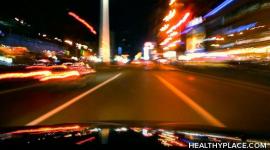Antipsychotic Medication Side Effects When Prescribed for Bipolar Disorder

Detailed info on side effects of antipsychotic medications..
What is Tardive Dyskenesia (TD)?
I'd like to define this antipsychotic side-effect first, as all discussions of antipsychotic drugs make reference to tardive dyskinesia. Tardive Dyskinesia, or TD, is a side-effect that was especially prevalent in the older antipsychotics described below. TD involves involuntary repetitive movements often in and around the mouth such as moving the tongue around. It's a serious side effect as it can be permanent. Over many years of taking the older antipsychotics described below, 25% develop TD. Tardive means the side-effect can show up even after the drugs are stopped. Dyskinesia refers to the movement itself.
History of Antipsychotics: From Thorazine to Atypical Antipsychotics
Before the 1950's, psychiatric hospitals were not as they are today. Patients, especially those with psychosis, were often strapped down to beds and wheelchairs in the halls of overflowing psych wards. They were given strong sedatives, as there were no effective medications for psychosis. Though this does sound, and often was cruel, psychosis was so little understood and the behavior was often so agitated that the patients had to be either restrained or calmed in some way.
In 1954, the drug Thorazine (chlorpromazine) was the first medication specifically targeted for the treatment of psychosis. The effect of Thorazine on psychosis treatment simply cannot be overemphasized. It revolutionized the mental health world and hundreds of thousands of those treated with the drug went from living in institutions to returning to the public world. Thorazine helped clear the mind, increased emotional responsiveness and even worked for those who had been psychotic for years.
Of course, there is always a cloud over any revolutionary breakthrough. The side-effects of Thorazine were intense for many and sometimes permanent due to tardive dyskinesia. And furthermore, what is known as the 'deinstitutionalization' of psychiatric hospitals after the introduction of Thorazine actually put many people on the street who were not able to survive on their own. This is a problem that exists today.
Similar Thorazine-type antipsychotic drugs such as Haldol and Trilaphon soon followed. Once again they worked but the side-effects, including tardive dyskinesia, restlessness, sedation, and blunted emotions, were strong. It wasn't until the 1990s with the introduction of Zyprexa (olanzapine), Risperdal (respiridone), and Seroquel (quetiapine) that the risk of tardive dyskinesia was reduced. In the early 2000s, two new drugs Geodon (ziprasidone) and Abilify (aripiprazole) were introduced soon followed by Invega (paliperidone) and the newest from 2009 called Fanapt. These new antipsychotics were called 'atypical' in order to differentiate them from the older (typical) medications.
It was originally thought that the creation of the atypical antipsychotics meant that they were not only superior in terms of side-effects due to less TD, but that they were actually more effective than the older drugs. The findings of a recent study by the National Institute of Mental Health called the CATIE study disputes these beliefs. (CATIE stands for Clinical Antipsychotic Trials in Intervention Effectiveness.)
Dr. Preston explains:
"There is now controversy over whether the new atypical antipsychotics are actually more effective than the older drugs. The CATIE study found that the older drugs were just as good. The only difference between the two is the side-effect profile and especially the risk of tardive dsykenesia. The atypicals definitely have a lower risk of TD, but the two classes of drugs actually share many side-effects. So it often comes down to what a person can tolerate. Research clearly shows that if one antipsychotic doesn't work or the side-effects are too difficult to tolerate, it's essential that the person try other medications. Even if they are from the older class of drugs. "
Antipsychotics: Approved and Off-Label Use
Even though all of the antipsychotics available on the market can be used to treat bipolar psychosis, none are specifically approved for bipolar psychosis treatment by the Food and Drug Administration. Instead, certain antipsychotics are approved for either mania, depression or maintenance (relapse prevention.) Of course, antipsychotics are regularly prescribed for bipolar psychosis treatment. This is called off-label use and is very common and simply means that the drugs are prescribed, but are not officially approved by the FDA for psychosis. Thorazine (1973), Zyprexa (2000), Risperdal (2003), Seroquel and Abilify (2004) and Geodon (2005) have FDA approval for mania. Seroquel was approved for bipolar depression in 2007. Zyprexa and Abilify were approved for maintenance treatment in 2004 and 2005 respectively.
Antipsychotic Medication Side-Effects
There is no question that antipsychotics can be life-saving and life altering drugs for people with bipolar psychosis. The problem is that antipsychotic medications can cause significant side-effects. The most common being akathisia (extreme physical agitation), lethargy, dulled thinking and weight gain. Fortunately, many of these side-effects can be lessened and even prevented by the correct drug choice and dosage.
Unfortunately, as a few of these new drugs have now been on the market for almost ten years, a new side-effect pattern has emerged called metabolic syndrome. This syndrome involves weight gain around the middle as well as diabetes, heart disease risks and other related symptoms. All people on antipsychotics need to be monitored for metabolic syndrome as the effects can be very serious. On a positive note, unlike with TD, metabolic syndrome can be caught early and reversed once the person goes off the antipsychotic.
Antipsychotics and Weight Gain
While TD and metabolic syndrome-related diabetes and heart problems may be the biggest side-effect concern for health care professionals, it's usually the weight gain that upsets people with bipolar disorder the most. For example, Zyprexa is a very effective antipsychotic, but studies show that the average weight gain is 20 pounds! Once again, it's a trade-off. For some, the trade-off is weight gain vs. not being able to work or having to go to the hospital. It's not an easy choice. It may be that the person can change from a drug that causes weight gain to one that has less weight gain tendencies. It's all about working with a healthcare professional to find what works for you.
Important Note on Antipsychotic Medication Side-Effects
Antipsychotic drugs are very strong drugs. Many say that the drugs make them feel like a zombie and, in some cases, a very agitated zombie. As always, it's a trade-off.
I have a friend who has been on a high dose of antipsychotic medication for three years. When she goes down on the dose, the manic psychosis comes back. It's a dilemma. She is significantly dulled by the drugs and gained a lot of weight around her stomach- but the manic psychosis is far more serious. She tried other antipsychotic medications until she found the one that works the best. But now her doctor is worried about TD.
I am not telling this story to scare you. She is doing better every day, but it's important not to sugar coat what we go through due to these medications.
I have another friend who has been on mood stabilizers for years. When she added an antipsychotic medication to the mix, she told me she felt normal for the first time in her life- and she had no side-effects. It's truly an individual process.
Here is a note from Dr. Preston on how antipsychotic drugs affect each person differently:
"Antipsychotics have different side-effect profiles. Abilify is known to cause agitation with little weight gain while Zyprexa can be very sedating and cause significant weight gain. And yet, they are both very effective drugs for managing bipolar psychosis. If one antipsychotic doesn't work, it's important to try another and then microdose onto a new one by trying a small amount of the medication until it works and you can tolerate the side-effects. It would be a shame to try one antipsychotic and have a bad reaction and then not try another. It's very hard to treat bipolar psychosis without medications."
Antipsychotic Treatment in Bipolar Disorder
The main use of these drugs is in combination with other bipolar disorder treatment drugs (eg: Lithium, Depakote, Tegretol or Lamictal). Antipsychotic medications are more commonly used to treat Bipolar I due to the high incidence of psychosis with full-blown mania, though people like myself who have Bipolar II with a lot of mild to moderate psychotic depression often take antipsychotics as well. It usually takes a cocktail of medications for most people to successfully manage bipolar disorder and antipsychotics are an important part of the mix.
We truly have come a long way since the 1950's medication management of bipolar psychosis. With the advent of new medications, there is even more hope that psychosis can be managed easily and effectively. When you combine this information with a strong and healthy lifestyle, psychosis management and prevention are truly possible.
APA Reference
Fast, J.
(2021, December 28). Antipsychotic Medication Side Effects When Prescribed for Bipolar Disorder, HealthyPlace. Retrieved
on 2025, December 15 from https://www.healthyplace.com/bipolar-disorder/psychosis/antipsychotic-medication-side-effects


